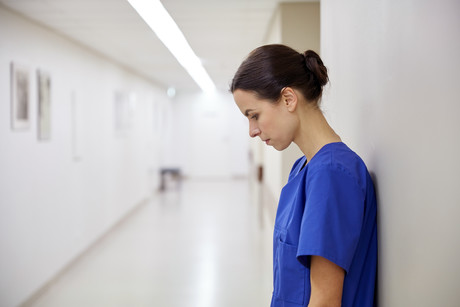Genetics is the key to solving clinical depression
Monday, 28 August, 2017

Scientists are seeking 10,000 Australian volunteers to complete the world’s largest genetics of depression study.
To date, the study has found that more than two-thirds of Australian participants rely upon multiple antidepressants to treat their clinical depression — a trial-and-error approach that remains a major challenge in delivering more effective mental health care.
The Australian Genetics of Depression Study — the world’s largest genetic investigation into clinical depression — recently revealed in that the medical profession has reached the limit of its current knowledge of treating clinical depression and requires far more personalised and targeted approaches to optimise outcomes.
Study author Professor Ian Hickie AM, co-director for health and policy, , is joining forces with fellow researchers, study participants and high-profile Australian mental health advocates, including Osher Günsberg, Dan Hunt, Julie McDonald and Mitch Wallis, to call for the enrolment of another 10,000 adults into the groundbreaking study.
“We require a total of 20,000 Australian study volunteers aged 18 and over who are undergoing or have been treated for clinical depression,” said Professor Hickie.
“In just over three months, we’ve enrolled 10,000 Australians into our transformative study.��This remarkable response demonstrates the general public’s willingness to partner with the research community, through the sharing of personal experiences digitally, to advance scientific understanding into clinical depression.
“Now we urgently need another 10,000 volunteers to help us crack the genetic code of our nation’s third-most burdensome disease,” Professor Hickie said.
One in seven Australians will experience clinical depression during their lifetime
The mental illness represents the top cause of non-fatal disability in Australia.��Moreover, our nation has one of the highest antidepressant-prescribing rates per head of all OECD countries — behaviour that delivers considerable benefits, but also forces many people to contend with ongoing, disabling and potentially life-threatening medication-related side-effects.
“Our interim data reveals better targeting of existing treatments through individual genetic profiling, before commencing medication, would drive a major advance in clinical therapy,” said Professor Hickie.
“Given our lack of diagnostic methods to predict different responses to antidepressants, or forecast the potential for intolerable side effects, we are exposing those battling clinical depression to trial and error, which is often slow to deliver significant benefits.
“To date, we have failed to move effectively from the general principles of treating clinical depression to much more personalised and targeted approaches that minimise risk to maximise benefit.”
Enlisting high-profile support
TV and radio personality Osher Günsberg, director of , is no stranger to mental illness. He battles social anxiety and obsessive compulsive disorder (OCD), has lived with post-traumatic stress disorder (PTSD), and harbours a family history of mental illness. Over time, Günsberg’s doctors have worked hard to fine-tune his medication so that the benefits outweigh the associated side effects.
“It took quite a long time, meeting with lots of different doctors, trialling multiple different medications and listening to different hypotheses about my illness, before we found a treatment that worked for me,” Günsberg said.
“I’ve tried life without being on medication for my mental illness, but it didn’t work for me.”
Günsberg is continuing his road to recovery today and is supporting the Australian Genetics of Depression Study to help researchers “identify ways to better treat people living with clinical depression individually, to more finely tune the treatment possibilities and to give people a chance to act before things get out of hand”.
Genetics is the key
Genetics is key to solving clinical depression according to Professor Nick Martin, lead study investigator and head of the Genetic Epidemiology Laboratory, .��
“The link between genetics and clinical depression is very clear. Approximately 20,000 genes make up the human genome.��Alterations in some genes cause clinical depression. But right now, we don’t know what they are. What we do know, however, is how to find them. We just need a large enough study, performed the right way, to identify them,” said Professor Martin.
“Our groundbreaking research should allow us to identify between 50 to 100 genes that influence a person’s risk of developing clinical depression. Only then, through cracking the genetic code of clinical depression, will we be able to develop new, and more effective, personalised treatments that target the problem directly.”
The interim study data also revealed that the overwhelming majority of respondents taking antidepressants discussed their mental health problems with friends (90%) and family (86%).��This is an important finding, for many of the risks associated with clinical depression, and the sense of isolation that ensues, can be reduced by sharing this information with trusted others. Open discussion did not always fix the problem, however, as dialogue with family members and friends was reportedly unhelpful in 20% and 10% of cases, respectively.
How to participate
Participating in the Australian Genetics of Depression Study is simple and free. Volunteers complete a 15-minute online survey and, depending upon their responses, may be asked to donate a saliva sample. Study researchers will then analyse the saliva samples to investigate and pinpoint specific genes that may be associated with clinical depression.
To volunteer for the Australian Genetics of Depression Study, or to learn more, head to or email gendep@qimrberghofer.edu.au.
The Australian Genetics of Depression Study is being conducted internationally, with 200,000 participant samples required. Australia is aiming to contribute 10% of the total study population.
Could this strategy mark a turning point in the HIV-cure search?
A team of Australian researchers have repurposed the same mRNA delivery system used in COVID-19...
Key concerns this Sarcoma Awareness Month
July is Sarcoma Awareness Month, and the Australia and New Zealand Sarcoma Association has raised...
Queensland gains private hospital surgery for lymphoedema
Greenslopes Private ���ϳԹ�Ⱥ�� in Brisbane now offers advanced microsurgery for lymphoedema,...





